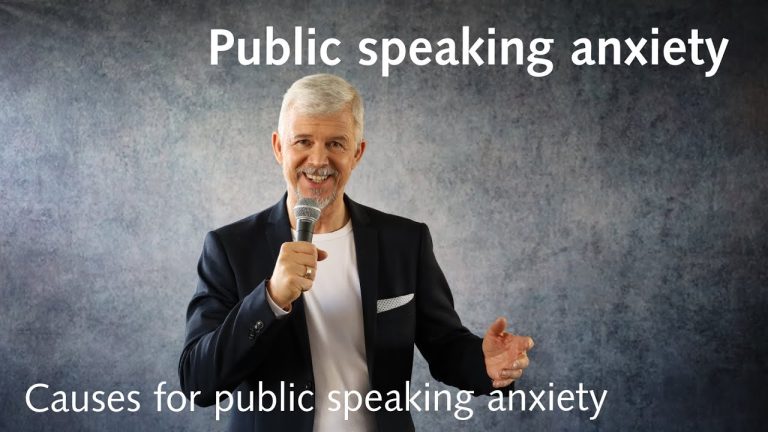How To Improve Public Speaking Confidence?
Public speaking is a skill that often instills fear and anxiety in even the most confident individuals. Whether you’re a seasoned professional or a student preparing for a class presentation, the fear of speaking in front of a crowd can be overwhelming. But fear not! In this guide, we will explore practical strategies and techniques to help you improve your public speaking confidence and deliver impactful presentations with ease.
Confidence is key when it comes to public speaking. The ability to express your thoughts clearly, captivate your audience, and convey your message effectively can greatly influence your personal and professional success. By understanding the underlying causes of your fear and implementing proven methods to overcome it, you can transform your public speaking experience from one of dread to one of excitement and empowerment. So, whether you’re looking to conquer your fear of public speaking or simply enhance your existing skills, this guide is your roadmap to becoming a confident and persuasive speaker.
How to Improve Public Speaking Confidence?
- Prepare and practice your speech or presentation thoroughly.
- Visualize success and positive outcomes.
- Focus on your breathing and use relaxation techniques.
- Engage with the audience by making eye contact and using body language.
- Start with smaller speaking engagements and gradually work your way up.
- Seek feedback and constructive criticism to improve.
- Join a public speaking group or take a course to gain confidence and practice.

Welcome to the Guide on Improving Public Speaking Confidence
This informative article will provide you with step-by-step details on how to improve your public speaking confidence. Whether you’re preparing for a presentation, speech, or simply want to feel more comfortable speaking in front of others, this guide will help you develop the necessary skills and boost your confidence. Read on to discover the proven strategies and techniques used by successful speakers.
Step 1: Prepare Thoroughly
Preparation is key to building confidence in public speaking. Start by thoroughly researching your topic and organizing your thoughts. Create an outline or structure for your speech, ensuring a logical flow of ideas. Practice your speech several times, focusing on articulation, tone, and body language. The more familiar you are with your material, the more confident you will feel when delivering it.
In addition to content preparation, consider the logistics of the speaking engagement. Familiarize yourself with the venue, equipment, and any technical requirements. Arrive early to set up and get comfortable with the surroundings. Being well-prepared will help alleviate anxiety and boost your confidence.
Step 2: Visualize Success
Visualization is a powerful technique used by many successful speakers. Take a few moments each day to visualize yourself delivering a confident and engaging speech. Imagine the audience responding positively, applauding, and showing interest in what you have to say. By visualizing success, you are training your mind to believe in your abilities, which can significantly increase your confidence.
It can also be helpful to watch videos of skilled public speakers to observe their delivery and body language. Pay attention to their confident presence and try to emulate their style while still staying true to your own personality. Practice in front of a mirror or record yourself to identify areas for improvement and build confidence in your delivery.
Step 3: Start Small and Build Gradually
If public speaking makes you particularly nervous, start by speaking in front of smaller, more familiar groups. Offer to present at team meetings or local community events. As you gain experience and receive positive feedback, gradually increase the size of your audience. This progressive exposure will allow you to become more comfortable and confident over time.
Consider joining a public speaking group or taking a course specifically designed to improve speaking skills. These environments provide a supportive community where you can practice and receive constructive feedback. Engaging with others who share similar goals can boost your confidence and provide valuable insights to enhance your speaking abilities.
Step 4: Embrace Nervousness
It’s important to understand that feeling nervous before speaking in public is completely normal. Even experienced speakers experience some level of nervousness. Instead of trying to eliminate nervousness altogether, embrace it and use it to your advantage. Channel your nervous energy into enthusiasm and passion for your topic. Remind yourself that being nervous indicates that you care about delivering a great speech, and it can actually enhance your performance.
Remember to breathe deeply and take pauses during your speech to help calm your nerves. Engage with the audience by making eye contact, smiling, and using gestures. These actions will not only make you appear more confident but also help you connect with your audience, further boosting your confidence.
Step 5: Seek Feedback and Practice Continuously
After each speaking engagement, seek feedback from reliable sources, such as trusted colleagues, mentors, or even audience members. Take note of their suggestions and incorporate them into your future practice sessions. Continuously practicing and refining your skills will not only improve your confidence but also enhance your overall speaking abilities.
Consider recording your speeches or presentations and reviewing them to identify areas for improvement. Pay attention to your body language, vocal tone, and any distracting habits. Make adjustments accordingly and practice until you feel confident in your delivery.
Step 6: Maintain a Positive Mindset
Lastly, maintaining a positive mindset is crucial for improving public speaking confidence. Replace self-doubt with affirmations and believe in your ability to deliver an impactful speech. Surround yourself with supportive individuals who encourage and uplift you. Remember that every speaking opportunity is a chance for growth and improvement, regardless of the outcome.
By following these steps and consistently practicing, you will gradually build your public speaking confidence and become a more effective communicator. Embrace the process, stay committed, and watch as your confidence soars.
Frequently Asked Questions
Here are some commonly asked questions about how to improve public speaking confidence:
Question 1: Why is public speaking confidence important?
Public speaking confidence is important because it allows you to effectively communicate your ideas and messages to an audience. When you are confident in your speaking abilities, you are more likely to engage and captivate your listeners, making a lasting impact. It also helps to build credibility and trust with your audience, leading to more successful presentations and opportunities for career advancement.
To improve your public speaking confidence, you can practice regularly, seek feedback from others, and focus on positive self-talk and visualization techniques. By addressing any fears or anxieties you may have, and by putting in the effort to develop your skills, you can gradually build confidence in your public speaking abilities.
Question 2: How can I overcome nervousness when speaking in public?
Nervousness is a common feeling when speaking in public, but there are several strategies you can use to overcome it. First, it’s important to prepare and practice your speech or presentation thoroughly. The more comfortable you are with the material, the less nervous you will feel. Deep breathing exercises and relaxation techniques can also help to calm your nerves before speaking.
Additionally, focusing on your audience and their needs rather than your own fears can shift your mindset and reduce nervousness. Remember that your audience wants you to succeed and is rooting for you. Lastly, start with smaller speaking engagements or opportunities to gradually build your confidence. With each successful experience, your nervousness will decrease over time.
Question 3: How can I improve my body language when speaking in public?
Body language plays a crucial role in public speaking as it can enhance or detract from your message. To improve your body language, start by maintaining good posture and standing tall. This conveys confidence and helps you appear more authoritative. Avoid excessive fidgeting or pacing, as it can be distracting to the audience.
Eye contact is another important aspect of body language. Make an effort to establish eye contact with different individuals in your audience, as this helps to engage them and establish a connection. Gesturing naturally with your hands can also add emphasis and expressiveness to your speech. Finally, be aware of your facial expressions and aim to convey enthusiasm and sincerity.
Question 4: How can I effectively engage my audience during a presentation?
Engaging your audience is crucial for maintaining their attention and ensuring that your message resonates with them. One effective way to engage your audience is by starting with a compelling opening that grabs their attention. You can use a personal anecdote, a thought-provoking question, or a surprising statistic to captivate their interest from the beginning.
Using visual aids, such as slides or props, can also enhance audience engagement. These visuals can help illustrate your points and make your presentation more dynamic. Additionally, incorporating interactive elements, such as asking questions or encouraging audience participation, can further engage your listeners and make your presentation more interactive.
Question 5: How can I handle mistakes or unexpected challenges during a public speaking engagement?
Mistakes and unexpected challenges are a normal part of public speaking, and it’s important to know how to handle them gracefully. Firstly, remember that mistakes happen to everyone, and most of the time, the audience won’t notice or remember them as much as you do. Stay calm and composed, and don’t let a mistake derail your confidence.
If you forget a part of your speech or lose your train of thought, take a deep breath and pause for a moment. You can use this pause to collect your thoughts and then continue smoothly. It’s also helpful to have a backup plan, such as cue cards or key points written down, in case you need a reminder during your presentation.
Lastly, maintain a positive attitude and focus on the overall message you want to convey. Remember that your audience is there to learn from you, and they will appreciate your resilience and ability to handle unexpected challenges with grace.
The surprising secret to speaking with confidence | Caroline Goyder | TEDxBrixton
In conclusion, improving public speaking confidence is a journey that requires dedication, practice, and a willingness to step out of one’s comfort zone. By implementing the strategies discussed in this article, such as preparing thoroughly, practicing regularly, and seeking constructive feedback, individuals can gradually build their confidence and become more effective public speakers. It is important to remember that confidence is not built overnight, but with consistent effort and a positive mindset, anyone can overcome their fears and excel in public speaking.
Ultimately, the key to improving public speaking confidence lies within oneself. By embracing the challenge, taking small steps, and celebrating progress along the way, individuals can transform their anxiety into excitement and their self-doubt into self-assurance. With time and practice, the fear of public speaking can be replaced with a sense of empowerment and the ability to captivate an audience with confidence and credibility. So, don’t let fear hold you back – embrace the opportunity to develop your public speaking skills and watch as your confidence soars.


